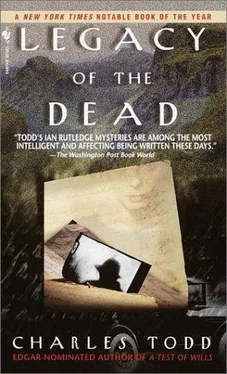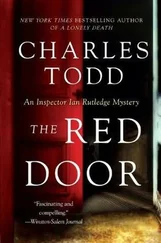Charles Todd - Legacy of the Dead
Здесь есть возможность читать онлайн «Charles Todd - Legacy of the Dead» весь текст электронной книги совершенно бесплатно (целиком полную версию без сокращений). В некоторых случаях можно слушать аудио, скачать через торрент в формате fb2 и присутствует краткое содержание. Жанр: Полицейский детектив, на английском языке. Описание произведения, (предисловие) а так же отзывы посетителей доступны на портале библиотеки ЛибКат.
- Название:Legacy of the Dead
- Автор:
- Жанр:
- Год:неизвестен
- ISBN:нет данных
- Рейтинг книги:5 / 5. Голосов: 1
-
Избранное:Добавить в избранное
- Отзывы:
-
Ваша оценка:
- 100
- 1
- 2
- 3
- 4
- 5
Legacy of the Dead: краткое содержание, описание и аннотация
Предлагаем к чтению аннотацию, описание, краткое содержание или предисловие (зависит от того, что написал сам автор книги «Legacy of the Dead»). Если вы не нашли необходимую информацию о книге — напишите в комментариях, мы постараемся отыскать её.
Legacy of the Dead — читать онлайн бесплатно полную книгу (весь текст) целиком
Ниже представлен текст книги, разбитый по страницам. Система сохранения места последней прочитанной страницы, позволяет с удобством читать онлайн бесплатно книгу «Legacy of the Dead», без необходимости каждый раз заново искать на чём Вы остановились. Поставьте закладку, и сможете в любой момент перейти на страницу, на которой закончили чтение.
Интервал:
Закладка:
The Scottish police-with permission from their counterparts in England-had come to a village some miles west of Durham to tell a woman that it was possible her daughter’s remains had been discovered on a Scottish mountainside in a place called Glencoe. Lady Maude Gray took exception to the Scottish Inspector’s manner and insinuations, and she had her butler throw him out. This didn’t sit well with his Chief Constable, who complained to the Chief Constable across the border. Neither of them could persuade her ladyship to give them so much as the time of day.
“You’re being sent to smooth troubled waters, in a manner of speaking, and to find out whatever you can about this missing girl. The Scottish police will be grateful. As far as I can tell, reading between the lines, her ladyship is highly thought of in certain circles and she’s strong-minded enough to do as she pleases. You’ll need every ounce of diplomacy you possess to get through the door, much less into her presence. But failure is unacceptable. Do you understand me?”
Rutledge understood very well. If he annoyed her further, Lady Maude could crucify all of them. If he left without seeing her, it would be viewed as his incompetence.
He took the papers Bowles thrust at him and, when the Chief Superintendent had gone, read them over. The facts of the case itself appeared to be simple enough. The problem lay in Lady Maude Gray’s refusal to discuss her daughter with anyone. The local police had noted: “She has never reported her daughter missing, but it is understood in the neighborhood that there was a rift between them that resulted in the daughter leaving early in 1916. When the young woman came into a large inheritance in 1918, the family solicitor advertised throughout the country for her to contact him directly, and the girl failed to do so.” Further discreet inquiries by the solicitor discovered that none of her acquaintance had had word of or from her either. The solicitor reported his concern and asked for police help in locating her. That search was inconclusive as well. “It may well be that the remains found in Scotland are those of Eleanor Victoria Maude Gray-height and age appear to be a close match, and the time of death (thought to be autumn 1916) appears to be consistent with the last time anyone saw her. Her mother refuses all comment.”
The Scottish police were convinced that the mother’s refusal had to do with the fact that the daughter had been pregnant. The English police were reluctant to conclude that that was the cause of the quarrel between the two women. Some stiffness between the two jurisdictions had developed-the Scottish police believed they had already identified Eleanor’s murderer, while the English police were unsure that the girl was in fact dead.
Rutledge looked out the window at the rain streaking the grimy panes and the wet pigeons huddled in whatever shelter they could find. He’d hated the rain in the trenches, it was a torment of body and spirit. Wet wool, the stench of urine or vomit, the heavy sweetness of rotting flesh, the stink of dirty bodies, the slick, black, filthy mud that weighed down boots and caked faces and hands and matted hair under the helmets. The low clouds that hid the gas The drive north ought to be pleasanter than the weather here, he mused. And Hamish, a countryman at heart, found that thought agreeable as well. Rutledge took out his watch, realized that he might reach York before nightfall. He stood and stretched, set his current files in order, then walked out of his office and closed the door behind him.
Down the passage, walking toward the stairs, Bowles heard the faint sound and smiled with contentment.
4
Lady Maude Gray lived in an imposing house that could be described as palatial. It sat in a vast acreage of park-land that gave it privacy and offered fine views from all its windows. The village of Menton, which lay on the main road a mile and a quarter beyond the massive stone pillars that flanked the long drive, had been moved to its present location in the eighteenth century. Not even its church steeple was visible from the attics of the house. Where the village had once stood, a very fine allee of trees and grassy lawns led to a reflecting pool that mirrored a cloudless sky.
It had once been, Rutledge thought, glimpsing the sun-washed house in the distance as he made his way up the drive, a fortified abbey in the Middle Ages, but later architects had created a country house in the ruins, with the choir and apse of the abbey church, presumably the family chapel now, comprising one wing. The arched buttresses flowed smoothly upward toward a pinnacled roof, and the gray stone of the house fabric matched them to perfection, giving a sense of great age to the entire dwelling. The west front, the main entrance, boasted a graceful spread of steps rising from the drive; a formal garden set with an ornate fountain gave human dimensions to the spectacular view across the countryside that spread out beyond it. Hamish, regarding the view, grumbled, “A lonely place, this. You can hear the wind and feel the emptiness.”
To his Calvinist soul, the house itself was ostentatious and unwelcoming. For a man used to the crofts of the Highlands, often a heap of stone in the lee of a hillside, there was no room for display in the struggle for survival.
As Rutledge climbed the steps, he found himself wondering what his godfather would think of the effect achieved here. David Trevor felt the power of stone and mortar in his blood, a man whose eye and taste were trained but whose natural response to building had made him one of the most successful architects of his day.
He felt a sudden surge of guilt that he hadn’t replied to the invitation from his godfather, but there was no way to explain why the prospect of leave was anathema. The press of work would have to be his excuse.
Hamish said, “It’s no’ a lie, is it? Though ye’ve chosen it yoursel’. And I’d no’ care to come home now…”
The knocker, shaped like a pineapple-the symbol of hospitality-fell back on its plate with a heavy throm that seemed to echo through the house.
Eventually, a majestic butler opened the door, staring at Rutledge with cold disdain. His white hair, brushed to silver, and his height would have done honor to the lord of the manor. Lord Evelyn Gray, however, had been a short, stocky man with dark, curling hair and an iron-gray beard. Rutledge had seen him in London on a number of occasions before the war.
“Inspector Rutledge, Scotland Yard,” he said briskly into the silence. Hamish bristled in the back of his mind, an angry counterpoint to the icy regard. “I wish to see Lady Maude Gray.”
“Her ladyship has no business to conduct with the police,” the man replied, preparing to close the door in Rutledge’s face.
“On the contrary. The police wish to express regret for past misunderstandings, and I have been sent from London to offer this apology in person. It would be rude of her not to hear it.”
The butler looked Rutledge up and down. Rutledge smiled inwardly. If the intent had been to intimidate, it was a signal failure. Haughty the butler might be, but it was a reflection of his mistress’s importance and not his own. Sergeant-Major MacLaren, on the other hand, had been a different matter. A glance could quell an entire battalion. No one dared question his authority; it came direct from God. It was said that even officers walked in fear of him, and most certainly Rutledge himself had deferred to the man’s wisdom and experience on a number of occasions.
What the butler saw was a tall man with a thin face who was clothed in a well-cut suit and a firmness that matched his voice. Something in the dark eyes moved the butler to change his mind and say at last, “Wait here, if you please.”
Читать дальшеИнтервал:
Закладка:
Похожие книги на «Legacy of the Dead»
Представляем Вашему вниманию похожие книги на «Legacy of the Dead» списком для выбора. Мы отобрали схожую по названию и смыслу литературу в надежде предоставить читателям больше вариантов отыскать новые, интересные, ещё непрочитанные произведения.
Обсуждение, отзывы о книге «Legacy of the Dead» и просто собственные мнения читателей. Оставьте ваши комментарии, напишите, что Вы думаете о произведении, его смысле или главных героях. Укажите что конкретно понравилось, а что нет, и почему Вы так считаете.












